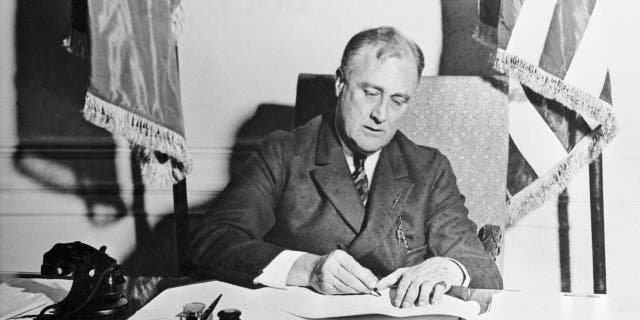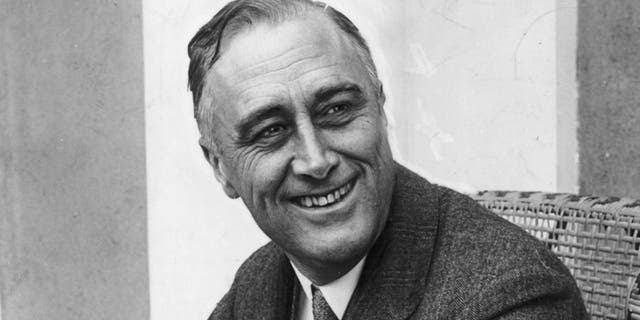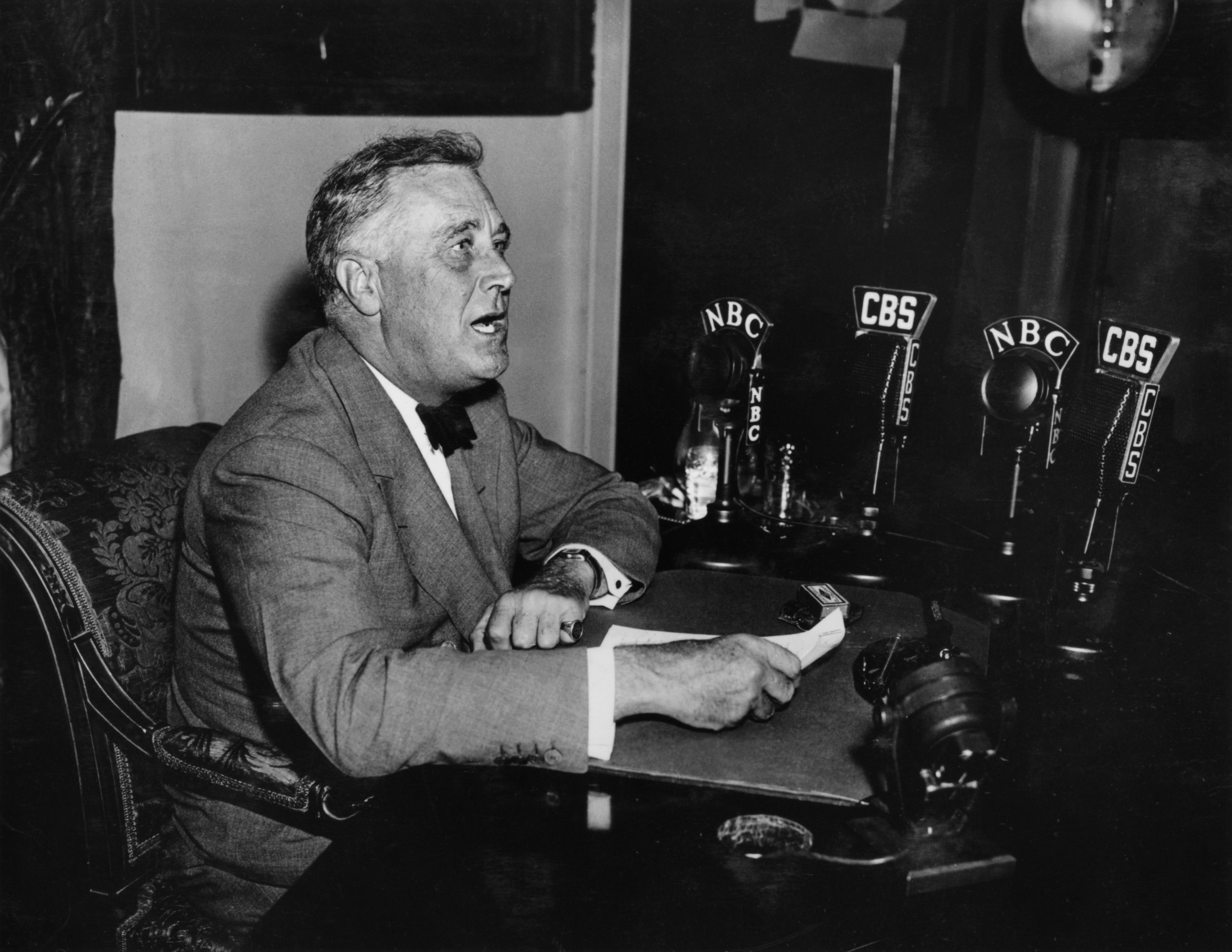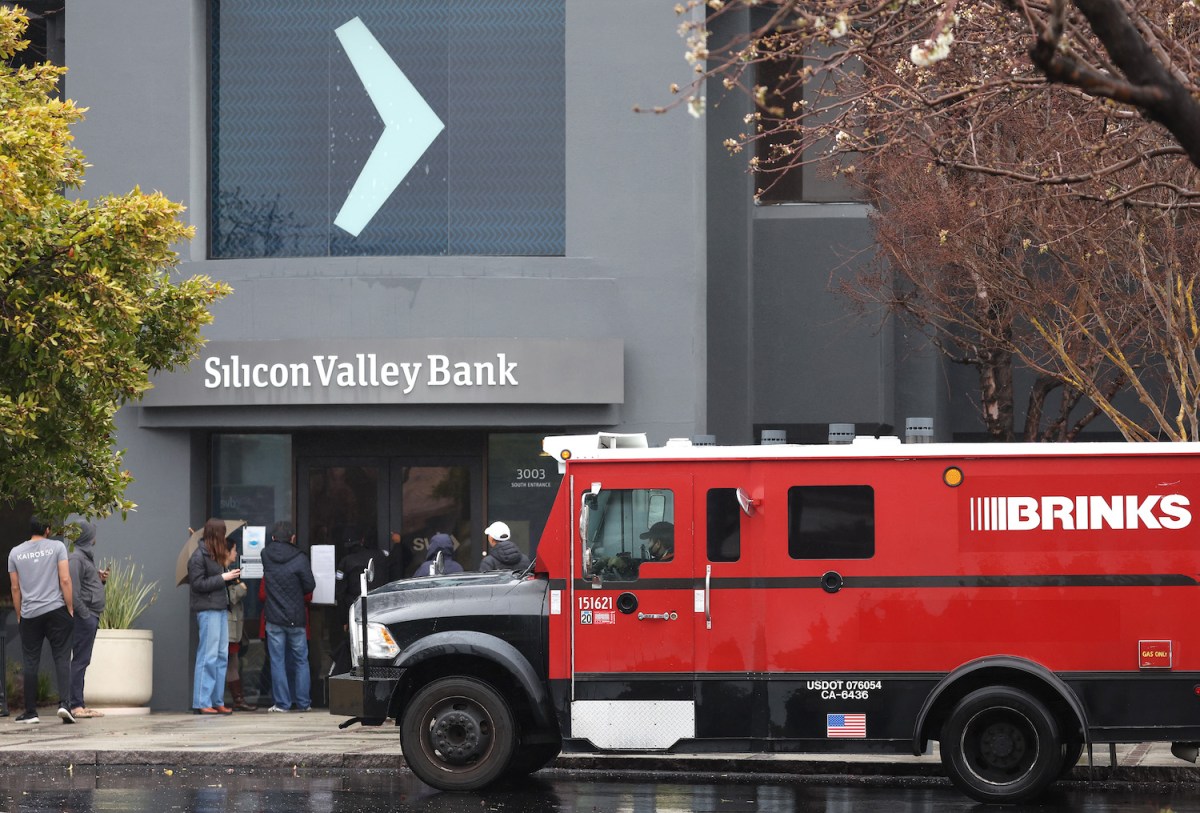President Franklin D. Roosevelt gave his first “fireside chat” on this day in history, March 12, 1933, to reassure and inform a nation reeling from the effects of the Great Depression.
This was the first in a series of broadcasts in which FDR spoke plainly and directly to every American within the sound of his voice, as Fox News Digital previously reported.
The term “fireside chat” was coined by Harry Butcher of the CBS radio network, according to Britannica.
ON THIS DAY IN HISTORY, MARCH 11, 1942, MACARTHUR LEAVES PHILIPPINES, VOWS TO RETURN
When Roosevelt took office in early March 1933, the Great Depression had spread across the globe, according to History.com.
America’s economy had declined to “desperate levels,” with banks failing, industrial production grinding to a halt and over 13 million people unemployed, the same site notes.
In his first inaugural address, Roosevelt sought to impart a new sense of confidence to a nation in despair, declaring that “the only thing we have to fear is fear itself,” notes the History site as well as other sources.
President Franklin Delano Roosevelt delivers one of his “fireside chat” radio broadcasts in this 1930s photo. (Stock Montage/Getty Images)
Not a “distant or aloof leader speaking down to his subjects,” the president began his first “fireside chat” remarks with the salutation, “my friends,” and “proceeded to engage listeners on terms that made sense to them,” said the National Archives.
The site also says, “Those who might normally be tuning into programs such as the Manhattan Symphony Orchestra or ‘D.W. Griffith’s Hollywood’ sat rapt before their sets as the president spoke with them, not at them.”
ON THIS DAY IN HISTORY, MARCH 10, 1876, ALEXANDER GRAHAM BELL MAKES FIRST TELEPHONE CALL FROM BOSTON LAB
Roosevelt used a conversational, informal tone in his addresses, notes the presidential library.
To describe the banking crisis in his first “fireside chat,” he said, “What, then, happened during the last few days of February and the first few days of March?”

FDR signs the Emergency Banking Act. Across the 12 years of his presidency, he would give over 30 “fireside chats” in an effort to help the American people understand and navigate challenging times. (Getty Images)
He continued, “Because of undermined confidence on the part of the public, there was a general rush by a large portion of our population to turn bank deposits into currency or gold — a rush so great that the soundest banks could not get enough currency to meet the demand.”
He closed the nation’s banks to prevent withdrawals from investors worried about bank failures, he explained, and said the banks would be re-opened the next day, according to the presidential library.
FDR thanked his listeners for their “fortitude and good temper.”
“Your government does not intend that the history of the past few years shall be repeated,” he said. “We do not want and will not have another epidemic of bank failures.”
He also thanked his listeners for their “fortitude and good temper” during the “banking holiday.”
ON THIS DAY IN HISTORY, MARCH 9, 1959, BARBIE MAKES FASHIONABLE WORLD DEBUT AT NEW YORK TOY FAIR
The president’s radio remarks had been publicized beforehand in newspapers and on radio, says the National Archives website.
Carried by the three major networks, the president’s remarks began from the White House promptly at 10:00 Eastern Time.

FDR went directly to the American people by radio, “forging a personal relationship with everyday Americans unlike any other president before,” says the National Archives. (Getty Images)
The White House “had yet to organize the radio and newsreel setups with the efficiency that would come later through experience,” notes the National Archives, but the broadcast “proved a success,” judging by the mail and telegrams that poured into the White House following the first “fireside chat.”
CLICK HERE TO SIGN UP FOR OUR LIFESTYLE NEWSLETTER
The address had an “immediate impact” in terms of instilling confidence in the banking system and the administration’s executive and legislative program.
Over the next 12 years, FDR would continue to go directly to the American people by radio, “forging a personal relationship with everyday Americans unlike any other president before,” says the National Archives.
CLICK HERE TO GET THE FOX NEWS APP
Roosevelt gave over 30 “fireside chats” in total, discussing everything from the banking crisis to the Works Relief Program to drought conditions in the U.S., according to the Franklin Delano Roosevelt Presidential Museum and Library.
He also built support for New Deal policies and discussed U.S. involvement in World War II during the broadcasts, they note.
Roosevelt was a “trailblazer” in using both technology and the media, and the impacts of his visionary approach are still felt today, says the National Archives.

















Discussion about this post